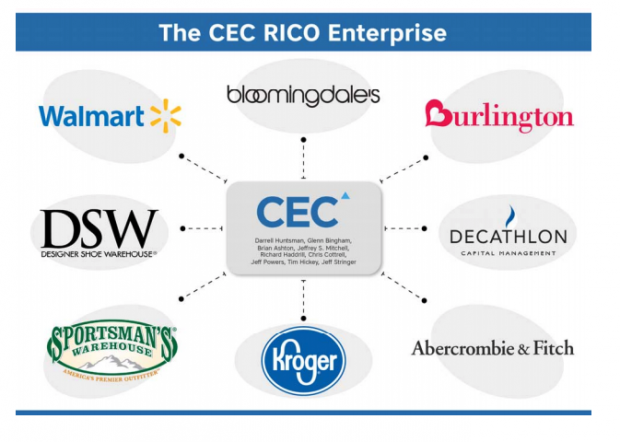Red-Handed Rip-off? Retailers Hit With RICO Lawsuit Over Shoplifting Program
A federal RICO lawsuit filed Monday in the Northern District of California claims a group of seven retailers, including Walmart and Abercrombie & Fitch, participated in a scheme to extort accused shoplifters.
April 09, 2018 at 06:12 PM
4 minute read

SAN FRANCISCO — The Racketeer Influenced and Corrupt Organizations Act is usually in the purview of federal prosecutors seeking to take down organized crime syndicates or drug cartels.
But in a federal RICO lawsuit filed Monday in the Northern District of California, lawyers at Block & Leviton claim a group of seven retailers, including Walmart Inc. and Abercrombie & Fitch, participated in a scheme to extort accused shoplifters into paying to take an online course aimed at scaring them out of future theft. The suit claims the companies partnered with the Corrective Education Co. in Utah.
Their “Restorative Justice” program came under scrutiny from a superior court judge in San Francisco last year, who found its practices were “textbook extortion.”
Monday's complaint claims the alleged shakedown was somewhat formulaic: Retailers' internal security personnel would detain suspected thieves, run a search for outstanding warrants on them, and then force them to choose between having the stores notify authorities or sign an admission of guilt and enroll in CEC's course. The complaint, which also names individual CEC executives and board members as defendants, claims suspected shoplifters had to fork over between $400 and $600 and complete the six-to-eight-hour course or face potential criminal consequences.
The suit seeks to certify a class of all people who have made payments to CEC through the program over the past four years and seeks treble damages, injunctive relief, attorney fees and “any other available remedies pursuant to RICO.”
Ragan Dickens, the director of national media relations for Walmart, said in an email that the company “began evaluating this program last year and ultimately suspended it last December.”
“We deny the allegations made against us and plan to defend ourselves,” Dickens said.
Representatives of the other retailer defendants—Abercrombie & Fitch, DSW, Burlington Coat Factory, Bloomingdale's, Kroger and Sportsman's Warehouse—didn't immediately respond to messages Monday, nor did representatives of CEC or Decathlon Capital Partners, an investment firm also named in the complaint which helped fund CEC's web-based education platform.
Reached by phone Monday, Jason Leviton of Block & Leviton said that CEC itself wasn't named in the RICO complaint because “it's just not how the statute works.”
“They are 'the enterprise' to the best of our knowledge,” he said.
The three named plaintiffs in the complaint, who filed anonymously, all were directed to CEC by Walmart. Jane Doe of Loganville, Georgia, alleges she was scooped up and accused of shoplifting hot dog buns and a case of water, Mary Moe of Hilliard, Florida, was accused of taking hygiene products and snacks, and John Roe of Houston was accused of shoplifting a “tri-ball hitch.” Doe and Moe claim they paid $500 and $400 to CEC, respectively, while Roe claims his CEC “account' was recently sent to collections.
“Allowing lawless companies to extort hundreds of dollars out of people before they are able to speak to a lawyer or speak to a parent or speak to a friend is simply unjust,” Leviton said.
“Business is business. I understand that. But at the same time, you can't take people at their lowest point and extort them,” he said.
The private lawsuit comes nearly two-and-a-half years after San Francisco City Attorney Dennis Herrera sued CEC, claiming the company's practices amounted to extortion and false imprisonment. In that case, San Francisco Superior Court Judge Harold Kahn found in August 2017 that CEC's program ran afoul of California's extortion laws.
“This is textbook extortion under California law, and has been so declared for at least 125 years,” Kahn wrote.
Howard Golds, of Best Best & Krieger in Riverside, represents CEC in the state court action, according to the docket. He didn't immediately respond to an email message Monday afternoon.
This content has been archived. It is available through our partners, LexisNexis® and Bloomberg Law.
To view this content, please continue to their sites.
Not a Lexis Subscriber?
Subscribe Now
Not a Bloomberg Law Subscriber?
Subscribe Now
NOT FOR REPRINT
© 2025 ALM Global, LLC, All Rights Reserved. Request academic re-use from www.copyright.com. All other uses, submit a request to [email protected]. For more information visit Asset & Logo Licensing.
You Might Like
View All


TikTok Hit With California Class Action for Allegedly Mining Children's Data Without Parental Consent

Khan Defends FTC Tenure, Does Not Address Post-Inauguration Plans
Trending Stories
- 16-48. It’s Comp Time Again: How To Crush Your Comp Memo
- 2'Religious Discrimination'?: 4th Circuit Revives Challenge to Employer Vaccine Mandate
- 3Fight Over Amicus-Funding Disclosure Surfaces in Google Play Appeal
- 4The Power of Student Prior Knowledge in Legal Education
- 5Chicago Cubs' IP Claim to Continue Against Wrigley View Rooftop, Judge Rules
Who Got The Work
Michael G. Bongiorno, Andrew Scott Dulberg and Elizabeth E. Driscoll from Wilmer Cutler Pickering Hale and Dorr have stepped in to represent Symbotic Inc., an A.I.-enabled technology platform that focuses on increasing supply chain efficiency, and other defendants in a pending shareholder derivative lawsuit. The case, filed Oct. 2 in Massachusetts District Court by the Brown Law Firm on behalf of Stephen Austen, accuses certain officers and directors of misleading investors in regard to Symbotic's potential for margin growth by failing to disclose that the company was not equipped to timely deploy its systems or manage expenses through project delays. The case, assigned to U.S. District Judge Nathaniel M. Gorton, is 1:24-cv-12522, Austen v. Cohen et al.
Who Got The Work
Edmund Polubinski and Marie Killmond of Davis Polk & Wardwell have entered appearances for data platform software development company MongoDB and other defendants in a pending shareholder derivative lawsuit. The action, filed Oct. 7 in New York Southern District Court by the Brown Law Firm, accuses the company's directors and/or officers of falsely expressing confidence in the company’s restructuring of its sales incentive plan and downplaying the severity of decreases in its upfront commitments. The case is 1:24-cv-07594, Roy v. Ittycheria et al.
Who Got The Work
Amy O. Bruchs and Kurt F. Ellison of Michael Best & Friedrich have entered appearances for Epic Systems Corp. in a pending employment discrimination lawsuit. The suit was filed Sept. 7 in Wisconsin Western District Court by Levine Eisberner LLC and Siri & Glimstad on behalf of a project manager who claims that he was wrongfully terminated after applying for a religious exemption to the defendant's COVID-19 vaccine mandate. The case, assigned to U.S. Magistrate Judge Anita Marie Boor, is 3:24-cv-00630, Secker, Nathan v. Epic Systems Corporation.
Who Got The Work
David X. Sullivan, Thomas J. Finn and Gregory A. Hall from McCarter & English have entered appearances for Sunrun Installation Services in a pending civil rights lawsuit. The complaint was filed Sept. 4 in Connecticut District Court by attorney Robert M. Berke on behalf of former employee George Edward Steins, who was arrested and charged with employing an unregistered home improvement salesperson. The complaint alleges that had Sunrun informed the Connecticut Department of Consumer Protection that the plaintiff's employment had ended in 2017 and that he no longer held Sunrun's home improvement contractor license, he would not have been hit with charges, which were dismissed in May 2024. The case, assigned to U.S. District Judge Jeffrey A. Meyer, is 3:24-cv-01423, Steins v. Sunrun, Inc. et al.
Who Got The Work
Greenberg Traurig shareholder Joshua L. Raskin has entered an appearance for boohoo.com UK Ltd. in a pending patent infringement lawsuit. The suit, filed Sept. 3 in Texas Eastern District Court by Rozier Hardt McDonough on behalf of Alto Dynamics, asserts five patents related to an online shopping platform. The case, assigned to U.S. District Judge Rodney Gilstrap, is 2:24-cv-00719, Alto Dynamics, LLC v. boohoo.com UK Limited.
Featured Firms
Law Offices of Gary Martin Hays & Associates, P.C.
(470) 294-1674
Law Offices of Mark E. Salomone
(857) 444-6468
Smith & Hassler
(713) 739-1250






